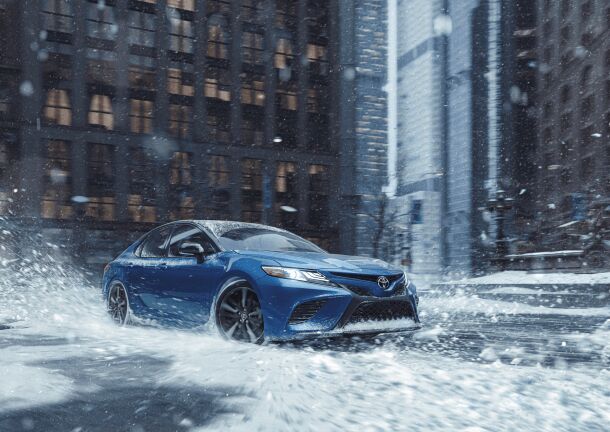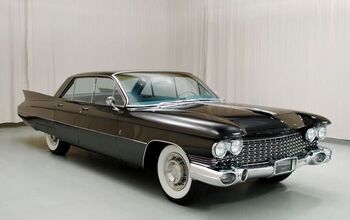Don't Drop Your Coffee: Toyota Unveils All-Wheel Drive Camry, Avalon

Depending on where you live, the newest variants of the Toyota Camry and its big brother, the Avalon, may arrive too late to help you conquer any wintry weather. This winter, anyway. Slated to arrive in North American markets starting early next spring, the two sedans boast something unfamiliar to owners of these long-running models: All-wheel drive.
In an announcement that took many by surprise, the automaker claims these new AWD sedans can thank the new-for-2019 RAV4 for their existence. A little engineering work later, and here we are. The 29-year drought of AWD Camrys has ended.
If you’re thinking that the AWD Camry and Avalon owe their development to a Lexus ES prototype you read about yesterday, think again. That sedan, tested by Japanese media, employed a hybrid car utilizing an E-axle setup, with the rear wheels operating independently of the vehicle’s drivetrain, a la the Prius AWD-e and the RAV4 Hybrid with E-Four.
These new beasts are gasoline-only models, though one can see that Toyota appears interested in offering a system for hybrid buyers. Stay tuned.
Not only are these new vehicles non-hybrids, but the AWD Camry and Avalon cannot be had with a V6 engine. The only powerplant here is the 2.5-liter inline-four, making 202 horsepower in the Camry LE, XLE, and SE (205 hp in the XSE) and 205 hp in the Avalon XLE and Limited. The company plans to offer this all-weather capability as a standalone option. The only external difference you’ll see is an “AWD” badge on the trunklid.
Unlike that hybrid prototype, both the AWD Camry and Avalon borrow the Dynamic Torque Control AWD system found in their RAV4 platform mate, which employs an electromagnetically-controlled coupling that engages and disengages the rear differential from the propshaft as needed. The system can send 50 percent of the vehicle’s torque rearward if the front wheels lose traction.
Adapting the system to the TNGA-based sedans took a little brainstorming.
From Toyota:
The [engineering] team combined the upper body structure of the Camry and Avalon with the engine, transmission, transfer case and rear differential from the RAV4. The RAV4’s version of the multi-link rear suspension was adapted with some modifications and tuning to suit the sedans. Both the Camry and Avalon AWD use a modified version of the propeller shaft from the all-new Highlander SUV.
Adapting the AWD drivetrain to the Camry and Avalon required floor structure modifications, plus the use of an electronic parking brake and a saddle-style fuel tank with an optimized capacity for AWD models rather than the flat-style tank in the FWD models.
Ride height is unchanged by the addition, Toyota claims, as is trunk floor height. Front suspension, wheels, and tires also carry over, as do standard and optional equipment.
Given that the rear axle will remain inert under most driving conditions, the automaker doesn’t anticipate much of a fuel economy penalty. There is a weight increase, however — 165 pounds for the Camry, while AWD Avalons will sport a heft similar to that of V6 models, the automaker said.
As for the Avalon’s Lexus ES sibling, there’s no word on an AWD version of that model, but today’s news almost guarantees we’ll see one. The all-wheel drive Avalon arrives later than the early-spring 2020 Camry variant; it’ll appear in the fall as a 2021 model. Pricing for the standalone AWD option remains TBD.
[Images: Toyota]

More by Steph Willems
Latest Car Reviews
Read moreLatest Product Reviews
Read moreRecent Comments
- Carrera 2014 Toyota Corolla with 192,000 miles bought new. Oil changes every 5,000 miles, 1 coolant flush, and a bunch of air filters and in cabin air filters, and wipers. On my 4th set of tires.Original brake pads ( manual transmission), original spark plugs. Nothing else...it's a Toyota. Did most of oil changes either free at Toyota or myself. Also 3 batteries.2022 Acura TLX A-Spec AWD 13,000 miles now but bought new.Two oil changes...2006 Hyundai Elantra gifted from a colleague with 318,000 when I got it, and 335,000 now. It needed some TLC. A set of cheap Chinese tires ($275), AC compressor, evaporator, expansion valve package ( $290) , two TYC headlights $120, one battery ( $95), two oil changes, air filters, Denso alternator ( $185), coolant, and labor for AC job ( $200).
- Mike-NB2 This is a mostly uninformed vote, but I'll go with the Mazda 3 too.I haven't driven a new Civic, so I can't say anything about it, but two weeks ago I had a 2023 Corolla as a rental. While I can understand why so many people buy these, I was surprised at how bad the CVT is. Many rentals I've driven have a CVT and while I know it has one and can tell, they aren't usually too bad. I'd never own a car with a CVT, but I can live with one as a rental. But the Corolla's CVT was terrible. It was like it screamed "CVT!" the whole time. On the highway with cruise control on, I could feel it adjusting to track the set speed. Passing on the highway (two-lane) was risky. The engine isn't under-powered, but the CVT makes it seem that way.A minor complaint is about the steering. It's waaaay over-assisted. At low speeds, it's like a 70s LTD with one-finger effort. Maybe that's deliberate though, given the Corolla's demographic.
- Mike-NB2 2019 Ranger - 30,000 miles / 50,000 km. Nothing but oil changes. Original tires are being replaced a week from Wednesday. (Not all that mileage is on the original A/S tires. I put dedicated winter rims/tires on it every winter.)2024 - Golf R - 1700 miles / 2800 km. Not really broken in yet. Nothing but gas in the tank.
- SaulTigh I've got a 2014 F150 with 87K on the clock and have spent exactly $4,180.77 in maintenance and repairs in that time. That's pretty hard to beat.Hard to say on my 2019 Mercedes, because I prepaid for three years of service (B,A,B) and am getting the last of those at the end of the month. Did just drop $1,700 on new Michelins for it at Tire Rack. Tires for the F150 late last year were under $700, so I'd say the Benz is roughly 2 to 3 times as pricy for anything over the Ford.I have the F150 serviced at a large independent shop, the Benz at the dealership.
- Bike Rather have a union negotiating my pay rises with inflation at the moment.




































Comments
Join the conversation
I was not drinking coffee but I was drinking tea and yes, I dropped my cup of tea. I waited this moment my whole life and now I finally I can buy Camry with AWD and fulfill my childhood's dream.
Shoulda called it the All-trac. Bring back the wagon too. Camry all-tracs were the outback of the 80s after the amc eagle got axed.